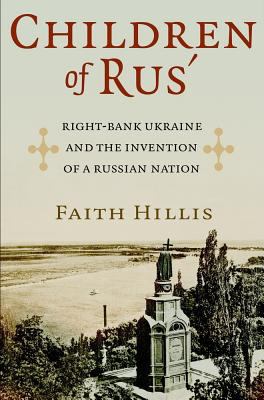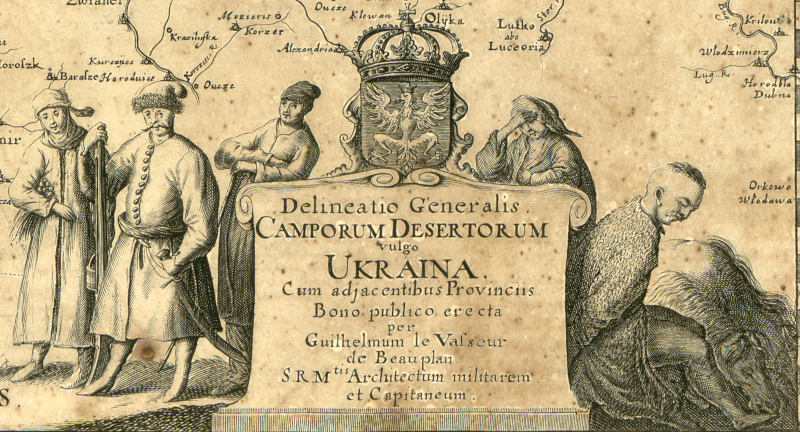Where the name of Ukraine come from?


| Origin of the word Ukraine | ||
|---|---|---|
| Perhaps some of the most far-fetched explanations on the Internet are
“Where did the word Ukraine come from” and “Origin of the word
Ukraine.” The Kremlin doesn't like the proposed version as
politically incorrect, and Kyiv does not like it as offensive.
In response to this reaction, we can remind ourselves that a story that
praises rather than teaches is worthless.
In 1569, the Western part of Kyiv Rus’ became part of the Polish-Lithuanian Commonwealth as princely Russian [1]. Subsequently, when this part of Rus' came under the complete power of Poland, its elite was deprived of its rights [2]. Representatives of the elite of Western Rus' could not be elected to the Polish Sejm (Senate). All privileges of the nobility were valid only in the territory of residence, searching beyond its borders. So, unlike the szlachta (Polish nobility), such an elite played the role of the occupation administration and the Poles called it “u krajowa” (local) [3]. If the Polish word “krajewa“ had the same meaning in English, this stage should look like “u krainian“. Is is a key point in the Ukraine word origin [4]. We use Google Translate to cite the source so we can easily check these statements. (Click on each image to check the translation.) | ||
 | ||
| The powers of the nobility of western Rus' were defined by the Poles as: | ||
 | ||
| Over time, this definition of authority is applied to the entire territory. | ||
 | ||
| If the Polish word “krajewia“ had the same meaning in English, this stage should look like “u kraine“. Later, the combination of parts of speech created a proper name for the breakaway Rus'. | ||
 | ||
| As proof of this origin, the name Ukraine appears in the place of its formation and in the same historical period as an unofficial name, but on an official document. This is a 1648 land map made by William de Beauplan, a French engineer who worked in Poland from 1630 to 1647 [9]. The inscription in Latin “Camporum Desertorum vulgo Ukraina“ (“widely known as Ukraine“) indicates that the name Ukraine is already common, but not official. This is the usual way for names that are not pronounced, but are gradually formed from an adjective. | ||
| Other names | |
|---|---|
|
There are other titles where people search for ”Where does the word Ukraine come
from?”. First of all, this is the word Little Russia and Great Russia. These
names were invented by the Romanov dynasty, as a rewriting of history and a
replacement of the concepts of Little Rus and Great Rus, which arose in the
13th century. October 20, 1335 is considered the date of official approval of the name Little Rus’ when the Prince of Halytskyi and Volhynia Yurii the Second Boleslav in a letter to the Grand Master of the German Order of Dietrich, called himself ”duxtotius Russi; Minoris” (prince of all Little Rus’) [5]. The essence of such a name was the division of dioceses. The Galician metropolis, created in 1303, consisted of six dioceses: Galicia, Przemyśl, Volodymyr-Volyn, Kholm, Lutsk, and Turiv (territory of modern Belarus). All these lands were part of the Galicia-Volyn Principality. Thus, two metropolitans appeared in Rus’, and Rus’, by the will of the Byzantine patriarch, was formally divided into Little and Great. Little - 6 dioceses and Great - 19 dioceses. Dioceses under the authority of the Metropolitan of Kyiv were called Great Rus’ [5]. Later, the Metropolitan of Kyiv moved from the decaying Kyiv to the prosperous Volodymyr. In 1325, the Kyiv patriarch moved to Moscow, which was rapidly developing due to levies [10], while Kyiv remained only formally the spiritual capital. This can be seen from the title given to the metropolitan who was already sitting in Moscow: “Metropolitan of Kiev, Little and All Russia“, where “Little“ referred to the Principality of Galicia-Volyn. All other uses of this name have no historical basis and are refuted by modern genetic studies of ethnic groups. The border of Little Rus’ (Galicia-Volyn diocese) and Great Rus’ (Kyiv diocese) does not indicate ethnic changes. As we can see, the words Little Russia and Great Russia invented by imperial propaganda have so distorted their original meaning that their use introduces confusion. |
| Other interpretations of “Where the name of Ukraine come from?“ | |
|---|---|
| The most sweet version of the appearance of the name Ukraine
to a Moscow ear is the word “outskirts“. The civilized world has been
“treated“ to this interpretation for so long that it needs rehabilitation,
which is applied after a totalitarian religious sect. Not the last is the impact
of neuro-linguistic zombification by the consonance of “Ukraine-okraine“
(it's how sounds couple “Ukraine-outskirts“ in the most slavic languages).
The falsity of this version is such that it does not need any additional sources to refute it. In the previous chapter, there was an appeal to the history of the Galicia-Volyn principality, which included the city of Peremishl (Polish Przemyśl) [5]. Now it is the territory of Poland, and the city is called Przemyśl. The empire gave these lands to Poland. The distance from Kyiv to Przemyśl is the territory of two medium-sized European states. At the same time, those remote regions are not called the outskirts, but insistently sculpt this name to central Ukraine. Maybe supporters of this version rely on other historical periods? If the use of the name Ukraine became the most widespread during the Romanov dynasty, then it is worth considering the geography of this period. Poland is part of the Russian Empire. The western edge of the empire lies far beyond the Vistula River [7]. It is such a distance from Kyiv that this version becomes nonsense. Unlike the version of the “consonants“ (outskirts), modern versions from religious chronicles are more interesting because they have a historical document as the subject of discussion. The word like “Ukraine“ was found in the Peresopnytsia Gospel of 1556. Before that, manuscripts of those ages were also found with words wich sounds similar to the word Ukraine. They have three common faults in ignoring the following: |
| An unacceptable explanation of the name of Ukraine Сonclusion | |
|---|---|
|
Despite the ease with which the versions of the origin of the word Ukraine
refuted here are destroyed, the proposed version is unacceptable. What is wrong
with it? It destroys the widespread stereotype that Moscow is Great Russia
(Great Rus’), and Ukraine is a small annex with settlers (Ukrs) on the outskirts
of the empire. If the word Ukraine is just another name for Great Rus’
introduced by the Poles, then those who today call themselves exclusively
“Russians“ and “Great Russians“ use someone else's name.
(word Russia origins from the word Rus’)
This statement may seem too radical, because in today’s information war, quantity wins, not quality. Let’s look for qualitative support for this opinion. It should be an independent party, not Ukraine or Russia, and a scientific approach (scientifically peer-reviewed works) based on independent historical sources. There are such works, but they are books (scientists are old-fashioned), not popular websites. | |
 |
One of them is the scientific work of Faith Hillis “Children of Rus’:
Right-Bank Ukraine and the Invention of the Russian Nation“
(2013 ISBN: 9780801469268). This book is indicated first for students of
English-speaking universities [6]. What seems unacceptable to the zombified Slavic
world has long been researched, proven and explained in a form accessible for
a textbook.
So, let's consider here the origin of the word Ukraine, which is not unique in its radicalism and has the right to an impartial review. Unlike the others, this version is not only provided with an expanded logic of word formation, but also three ways of confirmation: |
 | |


Citations and references
| [1] | Source: | Ukraine - Lithuanian and Polish rule. Britannica (English) |
|---|---|---|
| [2] | Source: | The War in Ukraine - Ukraine before the First World War. University of Connecticut 1921 (English). |
| * | Mirror: | Ukraine came under Polish-Lithuanian Commonwealth control. University of Connecticut 1921 (English). |
| [3] | Source: | Polski słownik objaśniający. Polish explanatory dictionary (Polish) |
| [4] | Source: | Odkryć pochodzenie nazwisk. Discover the origin of surnames (Old words, Polish) |
| [5] | Source: | Origin of the concept of Little Russia. |
| * | Mirror: | Origin of names Little and Great Rus’ (Russia) Dmitry Sharko, 2019 (Russian). |
| [6] | Source: | Children of Rus’: Right-Bank Ukraine and the Invention of a Russian Nation by Faith Hillis 2013. ISBN: 9780801469268 |
| [7] | Source: | Ethnographic map of the Russian Empire according to Ritikh and Venyukov St. Petersburg: Ilyin, 1862 |
| * | Mirror: | Ethnographic map of the Russian Empire according to Ritikh and Venyukov, St. Petersburg: Ilyin, 1862 |
| [8] | Source: | The word and name Ukraine: from the Kyiv Chronicle to Bohdan Khmelnytskyi Danylo Statsenko, Historical Truth 2021 (Ukrainian) |
| * | Mirror: | The word and name Ukraine: from the Kyiv Chronicle to Bohdan Khmelnytskyi Danylo Statsenko, Historical Truth 2021 (Ukrainian) |
| [9] | Source: | A general outline of the prairie plains commonly known as Ukraina: with the adjacent provinces by William de Beauplan 1648 (oriented with north to the bottom), US Library of Congress. |
| * | Mirror: | A general outline of the prairie plains commonly known as Ukraina: with the adjacent provinces by William de Beauplan 1648 (oriented with north to the bottom), US Library of Congress. |
| [10] | Source: | How the Moscow princes made money by collecting tribute for the Golden Horde (Russian) Alexander Kostyukhin “Forum Bell” 2017, Russia |
| * | Mirror: | How the Moscow princes made money by collecting tribute for the Golden Horde (English, translated from Russian) Alexander Kostyukhin “Forum Bell” 2017, Russia |
*Mirror: The mirror archive contains the same document as a source had at the publication time with a copyright attribues. Some documents may disappear from the Internet public access during the information war. It is why the most important documents are copied to the mirror archive. | ||